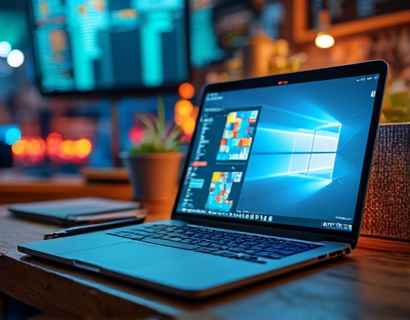Decentralized File Management: Streamlining Business Collaboration with a Secure and Efficient Online Platform for Teams
In the rapidly evolving landscape of business collaboration, the need for secure, efficient, and decentralized file management solutions has become paramount. Traditional centralized file management systems often fall short in providing the necessary security and flexibility required by modern teams. This article delves into the benefits and functionalities of a cutting-edge online platform designed to revolutionize business collaboration through decentralized file management.
The core principle of this innovative solution is decentralization, which offers a robust alternative to conventional centralized systems. By distributing data across a network of nodes, this platform ensures that no single point of failure exists, thereby enhancing security and reliability. This decentralized approach not only protects sensitive information from breaches but also ensures that files are accessible even in the event of network disruptions or server failures.
Enhanced Security Measures
Security is a top priority in any file management system, especially for businesses handling confidential and critical information. This decentralized platform employs advanced cryptographic techniques to secure data both in transit and at rest. Each file is encrypted using industry-standard protocols, ensuring that only authorized users can access the content. Additionally, the platform utilizes blockchain technology to maintain an immutable record of all file transactions, providing a transparent and tamper-proof audit trail.
The decentralized nature of the platform also means that data is not stored in a single location, reducing the risk of large-scale data breaches. Instead, files are fragmented and stored across multiple nodes, making it extremely difficult for unauthorized parties to access or manipulate the data. This distributed storage model not only enhances security but also improves data resilience and availability.
User-Friendly Interface for Seamless Collaboration
Despite its robust security features, this platform is designed with user experience in mind. The intuitive and user-friendly interface allows team members to navigate and manage files with ease. The drag-and-drop functionality, combined with a clean and organized dashboard, streamlines the process of uploading, sharing, and collaborating on files.
One of the key features of the platform is its advanced search functionality. Users can quickly locate files using sophisticated search algorithms that support keyword searches, file type filtering, and metadata searches. This ensures that team members can find the information they need swiftly, reducing downtime and increasing productivity.
Efficient File Organization and Sharing
Effective file organization is crucial for maintaining productivity and ensuring that team members can access the right files at the right time. This platform offers a hierarchical file structure, allowing users to create folders and subfolders to categorize their files systematically. Each file can be tagged with relevant metadata, making it easier to search and retrieve specific documents.
Sharing files within the team is seamless and secure. Users can grant specific permissions to team members, controlling who can view, edit, or comment on a file. This granular permission system ensures that sensitive information is only accessible to those who need it, while still facilitating collaboration and communication among team members.
Boosting Team Productivity
The decentralized file management platform significantly enhances team productivity by eliminating the bottlenecks associated with traditional centralized systems. With files stored and accessible across the network, team members can work from anywhere, at any time, without the need for cumbersome file transfers or version control issues.
The platform supports real-time collaboration, allowing multiple users to work on the same document simultaneously. Changes are saved automatically, and version history is maintained, ensuring that all team members are always working with the most up-to-date version of a file. This real-time collaboration not only speeds up the workflow but also reduces the risk of errors and miscommunications.
Scalability and Flexibility
As businesses grow and evolve, their file management needs change accordingly. This decentralized platform is designed to scale seamlessly, accommodating organizations of all sizes and industries. Whether a small startup or a large enterprise, the platform can adapt to meet the specific requirements of any team.
The flexibility of the platform extends to integration capabilities. It can be easily integrated with existing tools and applications, such as project management software, communication platforms, and CRM systems. This ensures a smooth transition and enhances the overall efficiency of the team's workflow.
Case Studies and Real-World Applications
To illustrate the practical benefits of this decentralized file management solution, consider a few real-world scenarios. A global software development team working across multiple time zones can use the platform to collaborate on codebases, share project files, and track changes in real time. The decentralized storage ensures that all team members have access to the latest code, regardless of their location.
In the healthcare industry, a network of hospitals and clinics can utilize the platform to securely share patient records and medical images. The immutable audit trail provided by the blockchain ensures compliance with regulatory standards, while the decentralized storage protects sensitive patient data from breaches.
For marketing teams, the platform offers a centralized hub for sharing campaign materials, tracking file versions, and collaborating on creative assets. The granular permission settings ensure that only authorized team members can access and modify sensitive marketing documents.
Future Trends and Innovations
The landscape of decentralized file management is continually evolving, with new technologies and innovations emerging to enhance the user experience and security. One such trend is the integration of artificial intelligence (AI) and machine learning (ML) to further optimize file organization and search capabilities. AI-driven suggestions can help users discover relevant files more quickly, while ML algorithms can predict and automate routine file management tasks.
Another area of development is the incorporation of Web3 technologies, such as decentralized storage solutions and token-based access controls. These advancements promise to bring even greater levels of security and decentralization, making the file management process more robust and user-centric.
Conclusion
In conclusion, the decentralized file management platform represents a significant leap forward in business collaboration tools. By combining enhanced security, user-friendly interfaces, and efficient file organization, it addresses the critical needs of modern teams. As businesses continue to prioritize digital transformation and remote collaboration, this platform stands out as a leading solution for streamlining information management and boosting overall productivity.











































